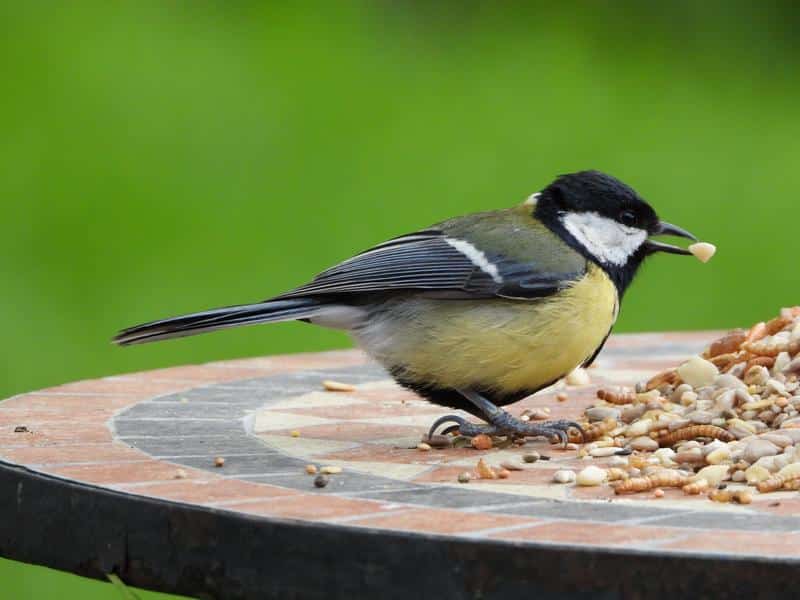Dog Eating Bird Seed? What to Do + How to Stop It! [10 Steps]
Do you keep catching your dog eating from the bird feeder and you’re not sure what to do about it? In our article, “Dog Eating Bird Seed? What to Do + How to Stop It!”, we’ll tackle all your concerns about this frustrating and also confusing behavior.
We’ll guide you through the process of stopping your dog from eating bird seed and discuss the reasons behind this unusual canine interest. Additionally, we’ll touch on whether or not dogs can safely eat bird seed and the potential risks, such as pancreatitis.
We’ll also explore what happens if your dog consumes bird suet, how to keep your dog away from bird feeders, and whether your furry friend might scare birds away from the feeder. So, if you’re ready to learn more about your dog’s bird seed snacking habits, let’s dive in below!
How to Stop Dog Eating Bird Seed

To stop dog eating bird seed:
- Keep bird seed hidden away or as out of reach as possible.
- Use a bird feeder that’s high up or that has a protective cage.
- Be sure your dog can always find a safe outlet for their chewing such as a toy that can keep them busy.
- Give a firm but calm “no” or “stop” right away when you catch your dog eating from the bird feeder again.
- Do not get mad or yell, because if they’re eating to soothe anxiety, this will only make their worries worse.
- Place them in a quick time-out in a closed-off room or their crate for roughly ten minutes.
- If you catch them starting to go after the bird seed, point them to one of their toys.
- Reward them with a small treat, pets, and praise when they select their toy rather than trying to eat bird seed.
- Make sure that everyone else who lives with you is also going by these procedures.
- Be patient and consistent.
These steps will get your dog to stop eating bird seed, but it’s important to remember that the underlying behavioral issues (hunger, curiosity, anxiety, etc.) that were causing all of this to begin with will still be present. And until you address them, any positive changes you see are only going to be temporary.
“Okay, how do I make these changes stick?”
By getting your dog to truly choose to follow your direction, that’s how. I tried many times to write out how you can do that before deciding it made more sense to just link you to the free video series that explains it better than I’d ever be able to.
The series is by a man named Dan who is one of the world’s leading dog obedience trainers. In it, he teaches you how to put an end to things like when your dog eats bird seed and all other misbehavior using his fast and easy-to-follow methods.
In the first video, Dan will reveal to you why the two most common methods of dog training only doom you to failure. You can watch the video now by clicking here. Follow the proven system he’ll show you in his series and you’ll never have to spend another second worrying about your dog eating bird seed ever again!
Why Do Dogs Eat Bird Seed?
Dogs eat bird seed for a variety of reasons, including curiosity, hunger, anxiety, or boredom. As natural scavengers, dogs are always on the lookout for food, and bird seed can pique their interest with its unique scent and flavor.
Some dogs might be attracted to bird seed because it’s different from their usual diet, and they may be intrigued by the novelty. In addition to curiosity and hunger, anxiety can also lead dogs to develop strange eating habits.
In some cases, they might turn to bird seed as a coping mechanism to self-soothe. Dogs experiencing stress or anxiety may engage in unusual behaviors to help alleviate their discomfort, and eating bird seed could be one of these behaviors.
Moreover, dogs are also attracted to movement and activity. If they observe birds flocking around a bird feeder, they might be drawn to the area out of sheer curiosity. Once they arrive, they may discover the bird seed and decide to give it a try.
Boredom can also play a role in your dog’s decision to eat bird seed. Dogs that are not getting enough mental and physical stimulation may look for ways to entertain themselves, and eating bird seed might provide a temporary distraction. Ensuring that your dog has plenty of engaging activities and toys can help prevent them from seeking out bird seed for entertainment.
Finally, some dogs might eat bird seed simply because they enjoy the taste. Though bird seed is not formulated for dogs and lacks the essential nutrients they need, it may still be appealing to your dog’s taste buds. In any case, it’s important to keep an eye on your dog and make sure they don’t have access to bird seed, as it can lead to digestive issues and other complications.
Storing your bird seed where your dog can’t get to it, or placing the feeder high up is a good beginning, but it’s crucial to realize that this won’t resolve the underlying issue. Your dog will simply seek out other objects to chew destructively in order to address their problem.
Your dog might eat bark, chew deck railings, chew landscape edging, or chew outdoor furniture. Virtually anything they can access will be a potential target. You can probably see why addressing the root cause of the issue is so important. To learn the exact steps to do that, go back to the first section of this article now.
Can Dogs Eat Bird Seed?
While dogs can technically eat bird seed, it’s not an ideal food for them. Bird seed is designed for the dietary needs of birds, not dogs, and it lacks the essential nutrients that dogs require.
Ingesting bird seed in small amounts is unlikely to cause serious harm, but it can lead to digestive issues like diarrhea, vomiting, or stomach pain if consumed in large quantities. Furthermore, bird seed can be a choking hazard, especially for smaller dogs.
Can Bird Seed Cause Pancreatitis in Dogs?
Bird seed itself is not a direct cause of pancreatitis in dogs, but it can contribute to the development of the condition. Pancreatitis is typically caused by a high-fat diet, and some bird seeds are coated in oil, which can be high in fat.
If your dog consumes a large amount of oily bird seed, it could potentially trigger an episode of pancreatitis. To be on the safe side, it’s best to keep your dog away from bird seed altogether. Go back to the first section now where we’ll cover more on how to do that.
What Happens if My Dog Eats Bird Suet?
If your dog eats bird suet, they may experience stomach discomfort and digestive issues. Bird suet is a blend of fat, seeds, and other ingredients that are designed to provide energy and nutrients to birds during the colder months.
The high fat content in suet can lead to gastrointestinal upset in dogs, including diarrhea and vomiting. Additionally, the solid nature of suet blocks can cause a choking hazard or create blockages in your dog’s digestive system. It’s best to keep them away from them completely.
How to Keep Dog Away from Bird Feeders
To keep your dog away from bird feeders, try placing the feeders in areas that are inaccessible to your dog, such as on tall poles or hanging from tree branches. You can also create a barrier around the bird feeder using fencing or other materials.
Training your dog to obey commands like “leave it” or “stay” can be helpful in preventing them from approaching bird feeders as well. Providing your dog with toys and activities that keep them engaged and entertained can also reduce their interest in bird feeders.
Will My Dog Scare Birds Away From Feeder?
Yes, your dog’s presence can scare birds away from the feeder. Dogs are predators, and their natural hunting instincts can make birds feel threatened and unsafe. To minimize this impact, consider placing bird feeders at a safe distance from your dog’s regular hangout spots or in areas where your dog cannot access. This will allow birds to feel more secure and be more likely to visit your bird feeder.
You should now know everything you need to handle your dog’s bird seed eating habits, so I’ll let you get started. Good luck with everything, and thank you for reading our article “Dog Eating Bird Seed? What to Do + How to Stop It!”





